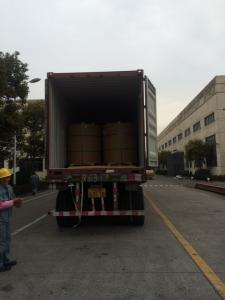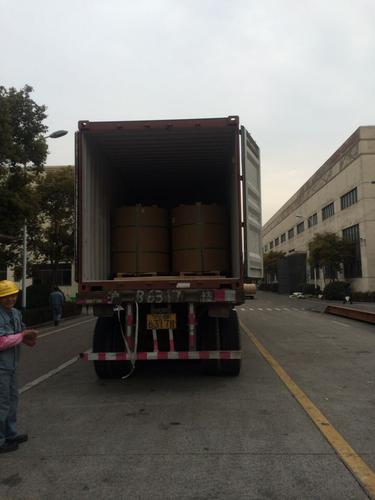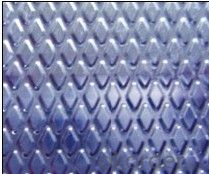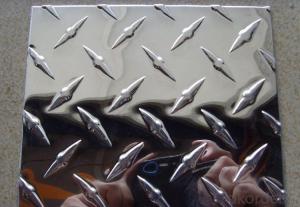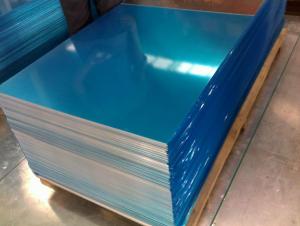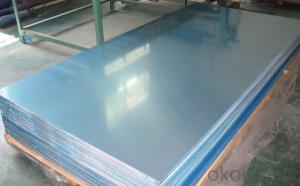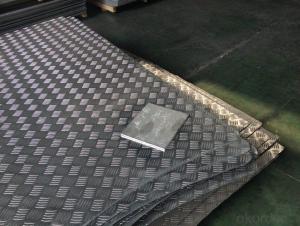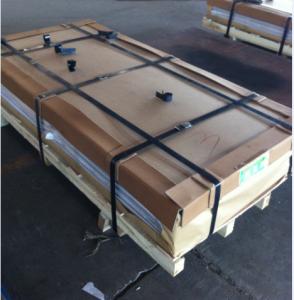5754 Transparent Aluminum Sheets Size Aluminum Plates
- Loading Port:
- Shanghai
- Payment Terms:
- TT OR LC
- Min Order Qty:
- 5 m.t
- Supply Capability:
- 3000 m.t/month
OKorder Service Pledge
OKorder Financial Service
You Might Also Like
1.Structure of Product Description
We are one Global 500 Enterprise , which can produce many different kinds of constructoin building material, such as: aluminium sheet, aluminium coil, and color embossed aluminium foil, etc. Aluminum sheet, aluminum plate, aluminu slab are all called aluminum material, Normally, they are widely used in the field of construction, decoration,e tc. we can produce different sizes and also can produce different grades, please kindly check below items for details. 1010, 1050,1060,1100, 2024, 3003, 3005, 3105, 5052,5754,5083,6061,6063,8011, etc.
The temper is include H14, H22, H24, H44,H112,H114,etc.
2. Main features of the product
a.Competitive price.
b.Frist-Class Service.
3. Image.
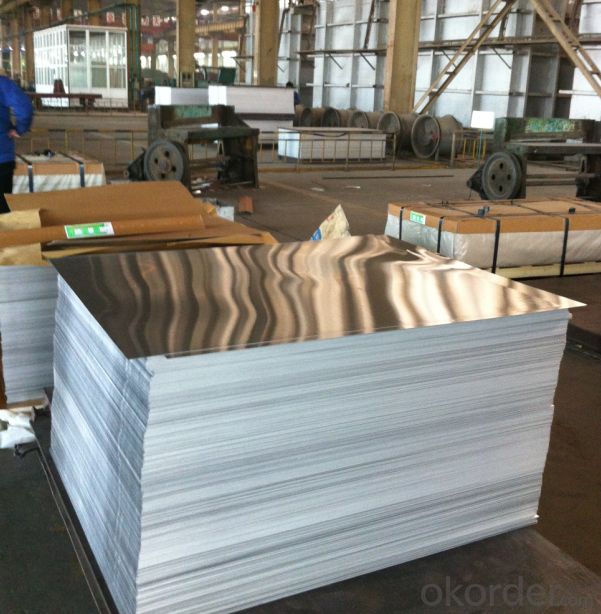
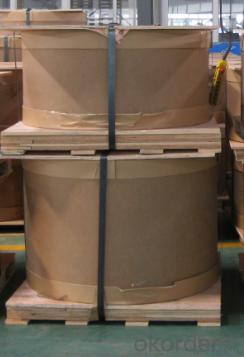
4. Product detailed sizes:
1000mm*2000mm, 1219mm*2438mm,1220mm*2440mm, 1250mm*2500mm,1500mm*3000mm, etc.
5. FAQ:
What is the quality standard?
---Usually our standard is GB3880-2006 or others.
What is the width range?
---It is from 1000mm to 2500mm, etc.
What is the length range:
---It is from 2000mm to 6000mm, etc.
- Q: AND WAT R THE THECNOLOGICAL ANDCOSTS AND BENEFITESOF USING ALUMINUM? what health -related and environment-related issues gave surface as aresult of its widespread use in society?
- airplanes are made from aluminum. certain beverages are also. aluminum is cheaper and lighter. the biggest problem is the amount of electricity that it takes to make aluminum
- Q: we have the mass of an aluminum sample =.47g, and the number of atoms in sample =107
- Alright - first, find the number of moles of aluminium in that sample, by dividing the mass (0.47g) by the molecular weight of aluminium (26.98). Then, having obtained the number of moles, multiply it by the avogadro's constant (6.023x1023) and you will obtain the number of atoms, and by dividing the mass by the number of atoms, you get the mass of an individual atom.
- Q: Can aluminum sheets be used for boat hulls?
- Yes, aluminum sheets can be used for boat hulls. Aluminum is a popular material choice for boat hulls due to its lightweight nature, high strength-to-weight ratio, and excellent corrosion resistance. Aluminum sheets are often used in boat construction to create hulls that are durable, sturdy, and capable of withstanding harsh marine environments. The versatility of aluminum allows for various fabrication techniques, making it suitable for different types of boats, including recreational boats, fishing boats, and even commercial vessels. Moreover, aluminum hulls require less maintenance compared to other materials, which makes them a cost-effective option for boat owners.
- Q: What are the standards and certifications available for aluminum sheets?
- There are several standards and certifications available for aluminum sheets, including the American Society for Testing and Materials (ASTM) standards, the Aluminum Association standards, and the ISO 9001 certification. These standards and certifications ensure the quality, durability, and performance of aluminum sheets, and help customers make informed decisions while selecting the appropriate product for their specific applications.
- Q: If Aluminum can, in fact, not be sterilized I would love to know why.
- Sterilization refers to the ability to clean a surface of bacterium. Simply pouring rubbing alcohol on something sterilizes it. Aluminum can be sterilized just as good as any other metal. If it couldn't, would we ship our favorite drinks in cans of it?
- Q: This question asks for a comparison between the benefits and drawbacks of utilizing products made from recycled aluminum.
- <p>Advantages of using recycled aluminum products include reduced energy consumption, lower greenhouse gas emissions, and a decrease in the need for raw material extraction. It also promotes waste reduction and supports a circular economy. Disadvantages might include potential quality concerns, as recycled aluminum might not always meet the same strength and durability standards as new aluminum. Additionally, there can be higher initial costs associated with recycling processes and the need for advanced sorting and processing technologies.</p>
- Q: doesn't particularly need to be welding but i need to make an air tight permanent seal around 2 very thin sheets of aluminium (like .02 inches thick) i was thinking .02 inch 5052 aluminum because its the thinnest i can find but am obviously up for suggestions.
- First you need a Tungsten inert gas welder (T.I.G. for short). The second step is to make sure the aluminum is clean. If you just bought it , and it looks clean ; it isn't trust me. Steel and aluminum are totally different in a lot of ways and that is one of them. I'm going to skip the safety instructions and shopping list , under the presumption that you already know the basics. Spray the area to be welded with acetone. rinse with clean water to remove lingering residue. then use a wire brush that has never been used on anything but Aluminum to clean the area. I'd go with a 4043 welding rod , it's a popular choice. Make sure to use clamps so that the 2 pieces of metal are squeezed tightly together with no gaps. (very important) I like to preheat my metal even if it's thin sheets , seems to come out better although it isn't usually called for in specs. side note ; If you have to step away from your work for more than 8 hours , you're going to need to re-prep it since it will have formed a layer of Aluminum oxide by that time.
- Q: is there any kind of deoderant, other than those crystals that smell, that don't have aluminum in it?
- Funny you should ask...I was reading the labels just yesterday on my deods also! Old Spice has Alum Hydroxide...Brut has Popylene Glycol and Old Spice High Endurance has Dipropylene Glycol. Ususally the 1st ingredient that you read on the label tells what it is the main ingredient. I prefer Brut!
- Q: Is it possible to utilize aluminum sheets in the construction of environmentally friendly buildings?
- <p>Yes, aluminum sheets can be used for green building materials. They are lightweight, durable, and have high recyclability, which reduces waste. Aluminum is also energy-efficient in production and use, and its reflective properties can help in reducing heat absorption, thus lowering cooling costs. Additionally, aluminum's resistance to corrosion and weathering means it requires less maintenance, contributing to its sustainability in green building practices.</p>
- Q: HEY HEY HEY guys its me agian and during today and the six week hoiday i'm gonna be askin a LOT I mean A-LOT ok so firstly I want to ask about drill bit you see as a willing studend who is enginenerring and just now in sience (so please ansewr quikly) what properites does an aluminium oxide drill bit have alot more questions after this one are going to be veary youtube and game related such as what do you guys want me to tweet pewdiepie on fridays whith pewdiepie and so on thanks and bye!!!!!!
- It doesn't have the drilled metal stick to it during drilling, it's hard, and it has a low specific heat capacity.
Send your message to us
5754 Transparent Aluminum Sheets Size Aluminum Plates
- Loading Port:
- Shanghai
- Payment Terms:
- TT OR LC
- Min Order Qty:
- 5 m.t
- Supply Capability:
- 3000 m.t/month
OKorder Service Pledge
OKorder Financial Service
Similar products
Hot products
Hot Searches
Related keywords
